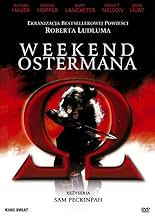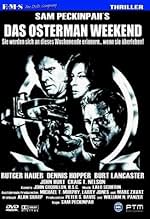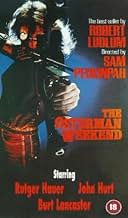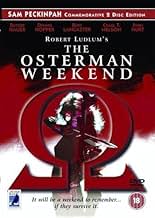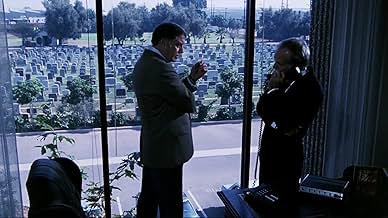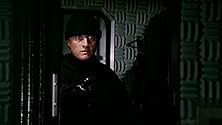Pendant la guerre froide, un journaliste de télévision controversé est sollicité par la C. I. A., on lui demande de persuader certaines de ses connaissances, qui sont des agents soviétiques ... Tout lirePendant la guerre froide, un journaliste de télévision controversé est sollicité par la C. I. A., on lui demande de persuader certaines de ses connaissances, qui sont des agents soviétiques du réseau Omega, de changer de camp.Pendant la guerre froide, un journaliste de télévision controversé est sollicité par la C. I. A., on lui demande de persuader certaines de ses connaissances, qui sont des agents soviétiques du réseau Omega, de changer de camp.
- Réalisation
- Scénario
- Casting principal
- Récompenses
- 2 victoires au total
Avis à la une
This actioner and suspenseful movie tells a convoluted and complicated tale of vendetta , espionage and treason . Interesting but slightly boring spy film , including an overly complex and confusing script , even though at times it is admittedly engrossing . The picture was made and released about eleven years after its source novel of the same name by Robert Ludlum had been first published in 1972 . Sam Peckinpah was fired as director during post-production. Others were Convoy and Ride the High County . When he refused to re-edit Osterman weekend after it was screened for a test audience and met with a confused and extremely mixed reaction. Producers took over the editing with the assistance of the editor , drastically altering opening and ending sequences. Mediocre and dark cinematography by John Coquillon , in fact , the picture involved a considerable amount of filming at night. It was filmed at a 1950s ranch located in upper Mandeville Canyon in the Hollywood Hills , it was a property once owned by Robert Taylor and has been frequently been known by the names the "Taylor Estate" . Anti-climatic soundtrack by Lalo Schifrin composed by means by synthesizer . Director Don Siegel, long time friend and mentor to Sam Peckinpah, recommended Lalo Schifrin as the film's composer. Schifrin had scored five of Siegel's movies ; composer Lalo Schifrin had to sit by Sam Peckinpah's sick bed in order to spot the film and decide which scenes did or did not need music.
Final film of director Sam Peckinpah. The picture was also Peckinpah's big "comeback movie", it was his first in five years, his last film having been at the time Convoy back in 1978 . The movie is also Peckinpah's only feature film of the 1980s decade . The production shoot for this film ran for fifty-four days . Director Sam Peckinpah was in ill-health throughout the shoot as the long-term toll of his drug and alcohol abuse suggested to many in the production that he was dying. Peckinpah after beginning as a writer , was soon involved in TV Westerns at the peak of his popularity ; shooting series just like ¨¨The Westener¨, ¨Gunsmoke¨and most popular ¨Rifleman¨, moving into films by 1961 when he made nice impression with ¨The deadly companions¨, ¨Ride the High Country¨ , Major Dundee¨ and his best picture ,Wild Bunch¨ . After that , he concentrated on nail-biting and tougher-than-tough action films just like ¨The getaway¨, ¨Convoy¨, ¨the ¨killer elite¨ and this last movie ¨Osterman weekend¨ . The final title as violent and nice as anyone the Western or wartime genre has given us .
John Tanner (Rutger Hauer) is a TV interviewer given an unpleasant assignment by CIA operative Lawrence Fassett (John Hurt): Confront a group of college friends with evidence they are working for a KGB operative named Mikalovich. An array of videotapes provided by Fassett demonstrates their culpability to Tanner. So he sets to work, his home the setting for a prearranged weekend gathering. If it works, a live interview with CIA Director Maxwell Danforth (Burt Lancaster) will be his reward.
For Peckinpah, it was his first film in more than half-a-decade, and a chance to show he was still able to deliver a solid action film well after his gritty early-'70s peak. The CIA comes equipped with cool surveillance equipment and laser-sighted automatics. The Weekend itself, once it gets going, has a nice "Big Chill" vibe with paranoid undertones.
So what goes wrong?
It starts with a 40-minute intro that establishes the premise in clunky fashion. "I'm Cloak, you must be Dagger" Tanner says upon meeting Danforth, whom Lancaster plays with brio but not subtlety. "Being wrong is not nearly as important as not admitting it, not these days," he tells one Company weasel, and acts throughout as the kind of clod you wouldn't put in charge of a shoe store, let alone the CIA.
Then we get to the Weekend itself, with Tanner's college friends taking center stage. Each has their quirks. Osterman (Craig T. Nelson) is a very cool TV producer who describes himself as "a nihilistic anarchist who lives on residuals". Nelson is great fun, though the rest of the group, including Dennis Hopper, gets lost in the mix. Only Helen Shaver's turn as a coked-out floozy stands out, as much for her gratuitous nude scenes as for her entertaining freak outs.
Sappy lite-jazz music by Lalo Schifrin underscores a lack of suspense. Hauer's Dutch accent keeps creeping in like Nastassja Kinski's, and his fragile relationship with his bow-toting wife (Meg Foster) isn't developed any more than those with his once-merry, now-sullen Berkeley chums.
The actual jigsaw puzzle we get here is indifferently assembled and seems at end a few pieces short. At one point Tanner hears Osterman on tape tell his friends "Let's go to our friend John Tanner's house and set him up". Tanner doesn't take this kindly, reasonably enough, yet what Osterman may have meant is never explained. A lot of threads are pulled out this way only to be left floating in the breeze.
John Coquillon's cinematography does capture something the rest of the film flails at, a sense of mystery and foreboding. Hurt's tortured performance as Fassett is nicely underplayed, watching beady-eyed between sips of wine from a china cup as the gears shift into play. And Nelson does crack me up, as in one scene which finds him running for cover.
"It'd be nice if we had weapons!"
"We do!" he is told. "Bows!"
"Bows?" Osterman replies. "That's keen!"
In the end, we get a wrap-up lecture about the pervading influence of television and how this all was, as one character puts it, "just another episode in this snuff soap opera we're all in." Peckinpah supposedly hated this script, only using it because he needed the film, but I think those sad words represent his actual mindset all-too-well. Distrait, somewhat lethargic, and depressing, "The Osterman Weekend" gives us lots of clues but no answers as to where Sam fell off.
However, the problems that Sam Peckinpah was going through at his last stages have noticeably affected the film. The intricate plot is there, but feels stitched together in parts, though that may very well be due the studio demanding re-editing work. The action is at times sloppy with very little of the mesmerizing details of Peckinpah's previous action sequences; a car crash even contains multiple repeats of the same angle and makes some disastrous continuity. The other action scenes are a notch or two better, but still far from what they could have been.
But, at least the plot and its many deceptions keep you guessing, right to the last shot. --- 6/10
BsCDb Classification: 13+ --- violence, sexual content
I gave this film 5/10 simply because I made it through to the end (and Rutger Hauer and John Hurt have done some great stuff), but it was more out of morbid curiosity as to how much more they could butcher the book than for any entertainment value. This was a film that was a product of its time (replete with cheesy music and bad acting) and it hasn't aged well. I'm glad I bought it for 25p because any more and I would've considered it a waste of money.
If it comes up on TV and you have 90 minutes burning a hole in your life, watch it - it isn't dreadful, but it's certainly not great. If you've read the book and are hoping to see it brought to life, or think that you're about to watch another Sam Peckinpah classic, give it a miss, it really isn't worth it.
Le saviez-vous
- AnecdotesDirector Sam Peckinpah was in ill-health throughout the shoot. The long-term toll of his drug and alcohol abuse suggested to many in the production that he was dying. Peckinpah would go off and take opportune naps, but still completed and delivered his initial cut of this movie on time, despite sickness and exhaustion.
- GaffesThe surveillance cameras installed in the Tanner house each have a red light to indicate that they are working. Surely a camera for secret surveillance would not have a visible indicator for all to see.
- Citations
Lawrence Fassett: Think of them as fleas on a dog hit by a car driven by a drunken teenager whose girlfriend just gave him the clap. It will help your sense of perspective.
- Versions alternativesOn the Anchor Bay DVD release there is a rough cut made by Sam Peckinpah which he made showed to the test audience. Because the majority of the audience walked out, from the imfamous sex between Fassett and his wife. The producer wanted Peckinpah to cut the scene out. Once he refuse to made the cuts, he got fired. Other scenes. 1) The sex scene is more extended and shot more wobbly to express how Fassett breaking point for revenge had started. 2) Delete scene of Osterman and Joe talking on the phone about their deal. 3) Extended scene of Virginia flirting with Dick on the phone. 4) There a deleted scene of John Tanner of having an affair with his director Marcia, there wakes up to find her dead. 5) The scene where Tanner and guest are arguing by the dinner table, in the theatrical cut Fassett switches on a Swiss ad, the Peckinpah's cut he has like a big image of Danforth. 6) Alterative ending is juxtapositioned between Tanner searching for his family and the TV studio.
Meilleurs choix
- How long is The Osterman Weekend?Alimenté par Alexa
Détails
Box-office
- Budget
- 6 500 000 $US (estimé)
- Montant brut aux États-Unis et au Canada
- 6 486 797 $US
- Week-end de sortie aux États-Unis et au Canada
- 301 129 $US
- 23 oct. 1983
- Montant brut mondial
- 6 486 797 $US
Contribuer à cette page



